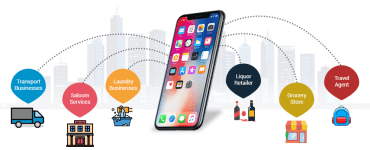The software development market is evolving at an astonishing pace. It offers a wide range of lucrative professional opportunities for developers, ranging from a high rate of pay to flexible working hours. Above all, becoming a software developer is a chance to make a positive mark on humanity.
For example, big data is revolutionizing social media marketing, making it more targeted and personalized. Back in 2009, cryptocurrencies were a new and abstract concept. Today, there are 6,955 digital currencies with a total market cap of $324.716 billion.
These examples only prove that keeping track of the latest trends is essential for developers. Industry innovations tell you where the industry is headed. Knowing where to focus your software development skills, you will adapt to clients’ needs faster and gain their trust.
In this article, we will explore the hottest software development trends to focus on in 2021 and beyond.
Artificial Intelligence Continues to Grow
Artificial intelligence enhances customer experiences in multiple ways. Let’s take the example of chatbots that provide real-time feedback, deliver personalized experiences, and automate customer service. Unsurprisingly, the role of AI in software development is immense.
Conventional software development involves a mound of manual processes, such as writing code, designing software, and testing. That is where artificial intelligence helps. Consisting of a wide range of technologies, such as machine learning, deep learning, and natural language processing, AI automates most of these processes. It creates agile workflows, increases productivity, and minimizes time-to-market.
Precisely because of that, implementing artificial intelligence is a necessity for software companies wanting to stay competitive in 2021 and beyond. According to a recent survey, the revenue from the application of artificial intelligence is predicted to hit $119 billion by 2026.
AI-enabled software development provides numerous benefits, including:
- Automating development process: Software developers spend significant time handling coding documents. Unsurprisingly, this increases the risk of human error. Artificial intelligence and machine learning have an impact on software development processes, such as identifying bugs before code testing, automatically performing quality assurance tests, minimizing the number of keystrokes needed, and identifying common coding mistakes and their variants.
- Simplifying project management: Artificial intelligence enhances project management by helping teams estimate costs and be more precise in identifying failure rates. It enhances developers’ productivity and lets them prioritize the sections of code that need to be completed fast.
- Detailed testing: Development teams have been using automated testing tools for years now. However, AI is taking this process to a whole new level. Apart from performing automated quality assurance tests, it can also generate test cases.
Cybersecurity Remains a Top Priority
With the rise of sophisticated data security threats, it is not surprising that cybersecurity remains a prominent consideration for software developers creating apps for enterprises. Online hackers use various types of attacks, including DDoS, phishing attacks, etc. Research predicts that cyberattacks will cause $6 trillion in losses by 2021.
Here are a few steps that will help you make your applications less vulnerable to online attacks:
- Hash passwords instead of encrypting them. Encryption is a two-way function. Therefore, everything you encrypt can be decrypted with the right key. Password hashing, on the other hand, is a one-way transformation of a password, meaning no one can directly reverse it.
- Avoid adding secret backdoors to your software since hackers can use them to install malware or steal your clients’ data.
- Offer regular software updates. As a software developer, it is your responsibility to provide software upgrades and patches.
Low-Code Development Saves Time
A decade ago, software development required teams of experienced coders to deliver new IT solutions. High expenses often prevented companies from bringing new ideas to life. Precisely because of that, low-code development platforms have gained popularity over the past few years.
A low-code development platform offers the graphical user interface for programming. Low-code programming is particularly important for developing business applications, letting companies create new software without investing more time and money. According to Gartner, low-code application development will be responsible for 65% of application development processes by 2024. The same study explains that 66% of low-code development platform users are professional developers from enterprise IT departments.
There are many benefits of low-code development platforms, including:
- Improving time-to-value: With low-code development, you can deliver business apps faster without having to expand your team or invest in new tools. You will also ensure faster decision making and improve developer productivity with reusable components, development toolkits, and visual user interfaces.
- Providing continuous improvements to users by delivering immersive, mobile, and engaging experiences.
- Eliminating the silo mentality and fostering stronger relationships between your teams. That way, your development team will be more agile and able to adapt to current customer needs.
Self-Taught Software Developers are on the Rise
Even though the IT industry is growing fast, there is still a gap in supply-demand for software development. This trend is making space for self-taught developers passionate about their jobs. Since the prices of conventional programming education are high, more people are turning to inexpensive software development courses. For example, if you are a Sydney-based programmer wanting to expand your skillset, you can easily find online IT courses in Australia with comprehensive training and certification.
With the rise of online platforms, you can attend top-quality software development courses, irrespective of your location or time zone. The goal is to motivate people about software development to level-up their coding skills without carrying the financial burden of formal education.
Python Remains One of the Most Lucrative Programming Languages
Combining machine learning and data science, Python has become one of the most popular programming languages. It benefits both new and experienced developers. Beginners love Python because it is simple to earn and, yet, powerful enough to create a web application or automate many manual processes. For experienced programmers that already use JavaScript, that is a chance to learn a new skill and add a powerful programming tool to their arsenal.
Therefore, if you have not learned the basics of Python, it is time to rethink your opinions. Python is the only programming language that makes machine learning easy-to-understand. It is also super-easy to set up. All you need to do is add your Python path to run Python from anywhere.
Continuous Development and Deployment are Crucial
The software development cycle can turn into a series of complicated and lengthy processes. Once a software development team produces code, they need to wait for it to be put into production. Meanwhile, they are expected to create new code, not knowing whether the previous features they added work. After the digital product is sent to an IT operations team, they may find out that many issues need to be fixed. That means more work for both your dev and IT operations teams, as well as higher expenses for your employer. Above all, delaying software releases may negatively impact customer experiences and compromise your brand image.
To ensure faster product delivery, companies are starting to invest in DevOps. DevOps relies on continuous delivery and continuous deployment to help IT companies produce software in shorter cycles and fix bugs on the go, without compromising product quality.
One of the major problems companies face, however, is the lack of DevOps tools and staff. According to DevOps Institute, 50% of companies struggle with managing people, operations, and tools associated with the DevOps transformation.
Start Preparing for Programming Trends in 2026
The needs of tech-savvy customers are changing fast. To cater to their needs and create apps they will use, you need to keep pace with the latest mobile app development trends.
In 2026, the focus is on creating agile, synchronized, and productive teams and automating repetitive and time-consuming aspects of developers’ jobs.
Traditional university-level education is no longer needed. No matter if you are starting a career as a software developer or you want to learn a new programming language, there is a wide range of online and offline programming courses to enroll.









